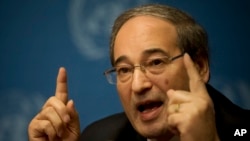GENEVA —
Syrian government and opposition negotiators are to get down to the main topic of their talks Monday, a political settlement to the country's nearly three-year-long civil war.
United Nations and Arab League mediator Lakhdar Brahimi reported some progress on a humanitarian issue in Sunday's talks.
“What we have been told by the government side is that women and children in besieged area in Old City [Homs] are welcome to leave immediately, and the other civilians are also welcome to leave but the government needs a list of their names first.”
Brahimi indicated he is not concerned about how the government might use such a list. He said there is also hope that an aid convoy can get into the city, but that is not confirmed. Brahimi said negotiators also discussed the possible release of detainees, but he reported no specific progress on that.
On Monday, the discussion is to turn to the core issue of these talks, the political future of Syria. Deputy Foreign Minister Faisal Makdad said Sunday that President Bashar al-Assad is not going anywhere.
“If any opposition, when they want, I mean, a leader to step down, you will not find a single leader in the world," Makdad said. "If some people think we are coming here to give them the keys to Damascus, they are wrong.”
Makdad was defiant and emotional in an hour-long news conference. He blamed all of Syria's problems on terrorists and foreigners.
There has been harsh rhetoric from both delegations, with each saying the other is insincere and illegitimate.
Opposition delegation member Monzer Akbik said progress on the Homs issue will be a test for the government, but the political talks will go ahead in any case.
“If there are no aid convoys entered Homs, then we consider that the other party is not serious about this process," Akbik said. "And if there's no progress in this area, we will still move on with the political talks tomorrow.”
The mediator expressed the hope that talking about humanitarian issues and prisoners first would make it easier, or at least possible, to talk about the more difficult issue of political transition.
Related video from VOA
But Brahimi indicated Monday's talks will only be a beginning.
“On the first day nobody made an opening statement. Only I did. So I think tomorrow I expect the two parties to make some general statement about the way forward,” he said.
Brahimi said the process will be slow, but added that is not necessarily a bad thing because any progress needs to be solid.
United Nations and Arab League mediator Lakhdar Brahimi reported some progress on a humanitarian issue in Sunday's talks.
“What we have been told by the government side is that women and children in besieged area in Old City [Homs] are welcome to leave immediately, and the other civilians are also welcome to leave but the government needs a list of their names first.”
Brahimi indicated he is not concerned about how the government might use such a list. He said there is also hope that an aid convoy can get into the city, but that is not confirmed. Brahimi said negotiators also discussed the possible release of detainees, but he reported no specific progress on that.
On Monday, the discussion is to turn to the core issue of these talks, the political future of Syria. Deputy Foreign Minister Faisal Makdad said Sunday that President Bashar al-Assad is not going anywhere.
“If any opposition, when they want, I mean, a leader to step down, you will not find a single leader in the world," Makdad said. "If some people think we are coming here to give them the keys to Damascus, they are wrong.”
Makdad was defiant and emotional in an hour-long news conference. He blamed all of Syria's problems on terrorists and foreigners.
There has been harsh rhetoric from both delegations, with each saying the other is insincere and illegitimate.
Opposition delegation member Monzer Akbik said progress on the Homs issue will be a test for the government, but the political talks will go ahead in any case.
“If there are no aid convoys entered Homs, then we consider that the other party is not serious about this process," Akbik said. "And if there's no progress in this area, we will still move on with the political talks tomorrow.”
The mediator expressed the hope that talking about humanitarian issues and prisoners first would make it easier, or at least possible, to talk about the more difficult issue of political transition.
Related video from VOA
But Brahimi indicated Monday's talks will only be a beginning.
“On the first day nobody made an opening statement. Only I did. So I think tomorrow I expect the two parties to make some general statement about the way forward,” he said.
Brahimi said the process will be slow, but added that is not necessarily a bad thing because any progress needs to be solid.






